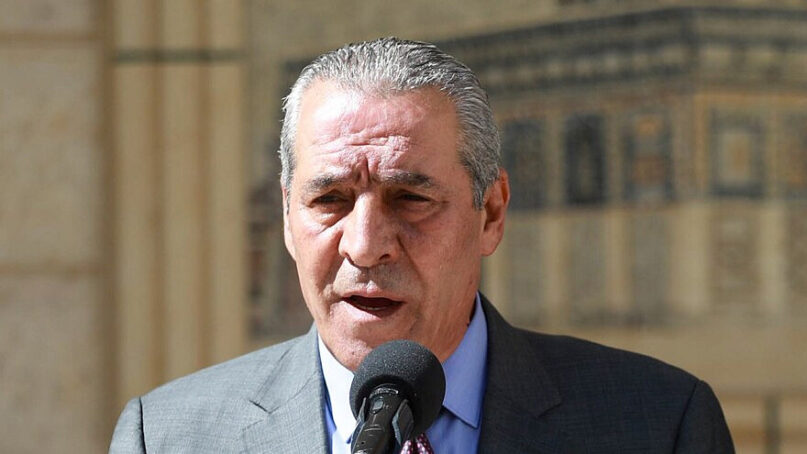
By Yoni Ben-Menachem
(Jerusalem Center for Public Affairs) The Palestinian Authority’s succession battle has kicked into high gear. Hussein al-Sheikh, confidant and designated successor of 86-year-old Palestinian Authority leader Mahmoud Abbas, has begun the process of taking over the Fatah movement in the territories.
Al-Sheikh plans to take control of the Fatah leadership by convening the Eighth Fatah Conference, which will elect the movement’s institutions. Through internal elections, he aims to remove several of his rivals from the leadership and thereby pave his way to becoming Fatah’s official candidate in the presidential elections once Abbas leaves the political stage.
On Monday, al-Sheikh met with all the Fatah secretaries in the West Bank to discuss the urgent need, as he sees it, to hold the Eighth Conference and make the necessary changes.
Senior Fatah activists say associates of al-Sheikh have been pressing Abbas recently to set a date for the conference. Initially scheduled for March, it was postponed because of disputes over the composition of the delegates.
The previous, Seventh Fatah Conference was held in Ramallah in 2016.
Ahmad Hilles, a member of the Fatah Central Committee from Gaza, said the issue of convening the conference would be on the committee’s agenda the next time it meets. That meeting, he stated, will take place this year because it is a national necessity.
Hilles was reiterating al-Sheikh’s public exhortation of a few days earlier. Al-Sheikh is recruiting Fatah’s younger generation in the territories, promising promotions to gain support.
Abbas has recently taken several measures to strengthen al-Sheikh as his successor. He appointed him as secretary-general of the PLO Executive Committee and added allies to the committee who will bolster the support for al-Sheikh.
Abbas also appointed his associate Rawhi Fattouh as head of the Palestinian National Council. He is expected to seek additional legitimacy for al-Sheikh in the Fatah institutions.
Al-Sheikh is considered Abbas’s most loyal confidant, and senior Fatah officials say he promised to tend to the needs of Abbas and his family members after his retirement. Abbas’s two sons own a vast economic empire, part of it in the P.A., and al-Sheikh vowed that no harm would come to it.
Fatah officials also say al-Sheikh intends to weaken two main rivals in the succession battle by removing them from the movement’s power centers in the internal elections.
The first is Tawfiq al-Tirawi, a Central Committee member and a former head of the Palestinian General Intelligence Service. A report by a P.A. investigative committee accused him of corruption and nepotism.
The second rival in question, Marwan Barghouti, was an architect of the terror of the Second Intifada and is serving five life sentences in an Israeli prison.
Barghouti is a member of the Fatah Central Committee and a bitter adversary of both Abbas and al-Sheikh. Palestinian opinion surveys show that he has the most support among the public to succeed Abbas.
Last year, Barghouti announced his intention to run in the upcoming P.A. elections. Abbas and al-Sheikh asked the Biden administration and Israel to make sure he would not be freed in any prisoner exchange with Hamas, explaining that he was a terrorist who would undercut the P.A.’s security coordination with Israel and the United States.
Al-Sheikh is planning on using the Eighth Fatah Conference to appoint an ally, Gen. Majid Freij, to the Fatah Central Committee. He also wants to appoint other associates, such as Adnan Ghaith, the P.A.’s governor of the Jerusalem district, and Ahmad Assaf, Palestinian communications minister, to high positions in Fatah.
The assessment in Fatah is that al-Sheikh will soon bring about the convening of the conference. Abbas has already given his consent in principle.
The P.A. succession battle could escalate dramatically and violently. The Palestinian street fears stepped-up assassinations in the West Bank because al-Sheikh’s political rivals have armed militias in a number of locales.
The Israeli defense establishment is watching from afar and not intervening in the succession contest. Fatah officials say, however, that Israel supports al-Sheikh’s efforts.
Yoni Ben Menachem, a veteran Arab affairs and diplomatic commentator for Israeli radio and television, is a senior Middle East analyst for the Jerusalem Center for Public Affairs. He served as director general and chief editor of the Israel Broadcasting Authority.
This article was originally published by the Jerusalem Center for Public Affairs.
Main Photo: Palestinian Minister Hussein al-Sheikh in Ramallah, July 24, 2021. Photo: Flash90








 Southern New England Jewish Ledger
Southern New England Jewish Ledger









